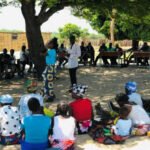More than nine percent of Tanzania’s population continues to practice open defecation which poses serious health risks, a new report by the World Bank has found.
Development Diaries reports that rural areas in the country generally lag behind urban centres in all dimensions of access to water, sanitation, and hygiene (WASH) services.
According to the report, titled Tanzania Economic Update: Clean Water, Bright Future: The Transformative Impact of Investing in WASH, only 61 percent of households have access to basic water supply, 32 percent to basic sanitation, and 48 percent to basic hygiene.
Poor access to WASH has been identified as one of the significant barriers preventing adolescent girls from completing their schooling.
Also, only 25 percent of schools in Tanzania met the minimum government standard for learners per toilet (20 girls and 25 boys per toilet) and 16.7 percent of schools provided changing rooms with basic amenities, such as water, waste bin, soap and emergency supplies, according to the Tanzania National School WASH Report (2018).
‘For Tanzania to ensure universal WASH access, considerable upfront investment is required to avoid the devastating consequences of inadequate services’, World Bank Country Director, Nathan Belete, said.
‘Achieving WASH goals can support the jobs agenda while mitigating the adverse effects on workforce productivity and advance Tanzania’s objectives for inclusive growth and poverty reduction’.
The report urged the government of Tanzania to embrace improved WASH as a pre-condition of development, and to urgently resource the implementation of the WSDP-3.
It also recommended a combination of policy measures, institutional capacity building, and new financial arrangements at the national, subnational, and community level to address the problem.
Photo source: World Bank






